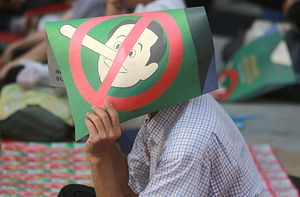Last week, on the fourth anniversary of the coup that saw them take control of Thailand’s government, the ruling military junta deployed more than 3,000 police to the streets of Bangkok. Outnumbering a group of pro-democracy protesters by about seven to one, the police broke up a peaceful march and arrested more than a dozen people, eventually dispersing the crowd who had braved torrential monsoon rain.
In the days prior to the protests, would-be marchers were subjected to widespread harassment and detention by security forces, while in the days that followed, the dozen arrested were charged with a range of offenses, including sedition.
Such hardline action is out of keeping with the Thai government’s pledge, made little more than two months ago, to “lift political restrictions” in June. The promised easing of highly repressive policies had been mooted as a first step on the road toward ending the junta’s rule ahead of a proposed general election in February 2019.
The anniversary crackdown, the latest of many over the last four years, makes a mockery of this rhetoric of reform. It also serves as a timely reminder of why the junta’s promised reform must be seen before it’s believed and why it’s time the international community turned up the pressure on Thailand’s government.
The events of the past few weeks were entirely consistent with the military government’s heavy-handed intolerance of any form of dissent over the course of their rule.
Since ousting Yingluck Shinawatra’s government in 2014, the National Council for Peace and Order (NCPO) – the ruling military governing body – has resorted to a range of tactics aimed at silencing anyone who criticizes them or raises concerns over political developments in the country.
Using a combination of existing legislation and newly introduced laws and decrees, the NCPO has placed severe restrictions on political activities. Public gatherings of more than five people have been made illegal, private communications are routinely monitored, and all public discourse on matters of national interest is actively stifled.
It’s a systematic crackdown on the key human rights to freedom of expression, association, and peaceful assembly that’s seen all sections of Thai society affected. Activists, including human rights defenders, have been targets, but they are not alone. The suppression has extended to human rights researchers for their work on rights violations, lawyers for defending their clients, journalists for reporting on sensitive topics, academics for expressing opinions on academic freedom, and politicians for criticizing the government.
Particularly outspoken individuals have been charged, convicted, and sent to jail. Others have faced job loss, the freezing of their assets, the revocation of their passports, and threats of expulsion from universities. Some have even been detained under an NCPO decree for “attitude adjustment” lasting up to seven days in unofficial locations.
With the junta seemingly immune to internal pressure, and showing no signs that it wants to stop abusing power to harass opponents, it’s time for the international community to insist that the human rights of Thais are restored, independently of any timeline for elections. The recent announcement that Prime Minister Prayut Chan-o-cha intends to visit EU member states including Britain, France, and Italy in June presents the perfect opportunity.
After freezing relations with the Thai government following the 2014 coup, the EU announced in December 2017 its intention to restore political contact with Thailand. Whatever their motive for re-establishing ties, the visit’s timing offers the ideal chance for the EU to deliver on its statement that the restoration of relations was “in order to facilitate meaningful dialogue on issues of mutual importance, including on human rights and fundamental freedoms.”
This need for concerted international pressure is all the more urgent in light of the general elections promised by the NCPO in February 2019. Recent experience, both in Thailand and across Southeast Asia, tells us that human rights violations almost invariably intensify in the lead-up to polling day.
Thailand’s constitutional referendum in 2016 is a case in point. In the months before the ballot, all critical voices were aggressively suppressed, with public forums cancelled, independent monitoring initiatives shut down, and books, pamphlets, letters, and other campaign materials seized. Those who dared to speak out against the draft constitution or question the validity of the referendum were detained.
In all, more than 100 individuals were charged with criminal offenses relating to their peaceful activities, while dozens of student activists were arrested and arbitrarily detained for protesting against military rule. Hundreds remain under investigation or behind bars.
Since taking power, the NCPO has fobbed off external criticism of its human rights violations with vague and repeatedly delayed promises to lift restrictions. What the junta meant by its latest promise remains unclear and authorities are noncommittal about exactly when – or even whether – in June any change will materialize. The EU must use all diplomatic means at its disposal to push for human rights to be restored immediately.
Without the wholesale repeal of the repressive laws and decrees that have been used to flout the Thai population’s rights for the last four years, there is a real danger the 2019 elections could descend into another round of mass violations. The hundreds facing criminal proceedings for voicing their opinions and joining peaceful protests must have their charges dropped, and those of them who are in jail must be released.
All of these issues must be on the table when the Thai prime minister embarks on his tour of European capitals this month.
Katherine Gerson is Amnesty International’s Thailand campaigner.

































